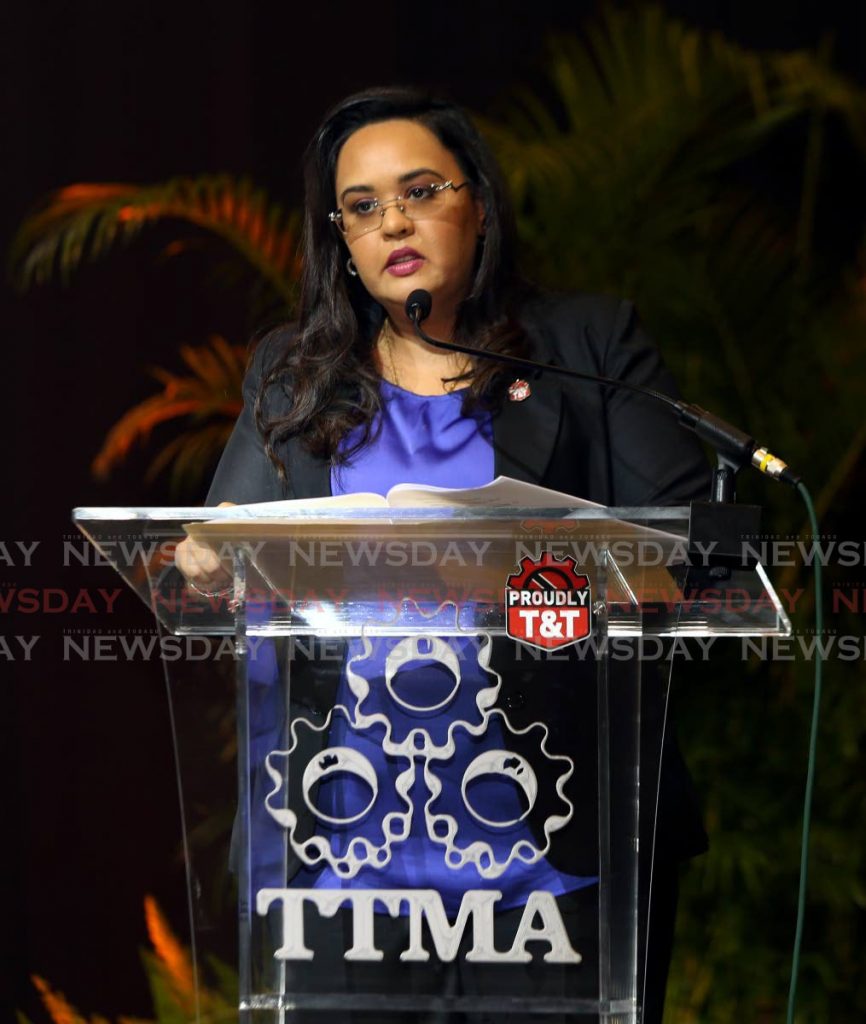Imbert: Government listening to the people

If there is one thing that Finance Minister Colm Imbert wants the country to take away from the 2021-2022 budget read on Monday, it is that Government is listening to the people and trying to address everyone’s needs.
Speaking at the Trinidad and Tobago Manufacturers Association’s (TTMA) post-budget seminar, at Hyatt Regency, Port of Spain on Tuesday, Imbert said from big to small businesses, to vulnerable groups the ministry and by extension the Government listened to what was needed, and made provisions to assist as many people as possible.
He again highlighted some of the provisions in the budget including cash cards for vulnerable groups for electricity and water, fuel – when the liberalisation of the fuel market is completed – as well as the removal of custom duties on electric vehicles. He also pointed out the tax incentives to boost businesses – tax holidays, reduced tax rates and tax exemptions – the abolishment of economic free zones to be replaced by special economic zones under an authority, mentorship programmes and special SME loans.
But there are still issues which the business community wants addressed – a permanent solution to the late payment of VAT returns being one of them. Panellists said while there were many good things in the budget questions still remain on if these provisions can be made and, if so how soon can they can get done.
Operating at a deficit
Government is still operating at a deficit of $9.1 billion, a little less than a billion more than last year’s deficit of $8.03 billion. However, Government plans to spend $52.4 billion – about $3 billion more than last year’s $49.6 billion.
Imbert spoke on the deficit, saying that one must realistically look at the expenditure of the country, especially in the face of a pandemic.
“This talk about balancing the budget is very theoretical,” Imbert said. “We were well on our way in 2018. We had the deficit down by three per cent, and things were going well. But then the energy sector started cutting back and of course in 2020 you had covid19.”
“Covid19 is an unprecedented shock, so all theories would go out the window. If you look at the world economy for 2020, the average deficit was 11 per cent of the world’s GDP.”
He said Government is faced with something that has never happened in the history of Trinidad and Tobago – dealing with an economic and health crisis at the same time.
He noted comments that TT should take a look at how countries like Jamaica managed expenditure but said TT is still unique as it spends at least three times more on its people than Jamaica does.
“Their per capita GDP is US$4,600. The per capita GDP in TT is US$15,400. So our per capita GDP is three times that of Jamaica. So, yes we want to balance the budget, but we also want to face reality. We have determined that our expenditure should be in the range of $50 billion or $40 billion otherwise you will put endless people on the breadline and sink several people into poverty.”
The country’s expenditure may also have something to do with Government’s challenges in bringing down food prices, especially since the lion’s share of food products is imported.

He said the last time a government got involved in food importation in the 1980s under prime minister George Chambers the process was “riddled with inefficiencies, cost overruns and theft.”
So Government did what it could – remove taxes on a list of items which included biscuits, oil, canned vegetables, cornflakes, canned fish, canned meat, juice, sausages, ham, ketchup, bottled water and pigtail.
Garnering revenue was also a focus in the budget and one of the measures which is expected to achieve that goal is the heavily debated property tax, for which the valuation process would begin with property assessments for the valuation roll.
Imbert said that no taxes are currently collected because the valuation division is only at the data-gathering stage.
During Monday's presentation, he said 127,969 valuation forms were submitted, but that was not enough to move on to different stages of the process. He said there must be a minimum of 50 per cent of properties listed on the valuation roll before any other steps could be taken.
At the seminar on Tuesday, he said there is an estimated 400,000 residential properties in the country.
“Therefore we would have to get to at least 200,000 properties before any tax could be calculated,” he said. “We are hopeful that by the end of November that we could reach that 200,000. But after that, the valuation division would have to do the actual calculation of values. What the division is doing right now is data-gathering.”
He said the division has to determine the physical features of a property and other identifiable characteristics such as location and age.
“When all that data has been collected it would have to be determined what would be the annual rental value of that property.”
Business community heartened, but…
Government sought to incentivise several groups in the expectation that the measures would boost productivity and at the end of it all increase revenues.
One of the more notable initiatives would be the repeal of the Free Zones Act to be replaced with special economic zones, regulated by an authority which would review and assess businesses in the zones along formulated standards and codes of conduct. A special economic zone is an area of the country which is subject to different regulations than other areas. This method is used to facilitate rapid growth by leveraging tax incentives to attract foreign investment.
Another highlight was the merger of InvestTT and ExporTT into a single trade and investment promotion agency, which Imbert said would promote diversification.
He also proposed reduced taxes for exporters of local goods, businesses focused on technology solutions, digitisation and construction and full tax holidays for the first five years for new SMEs listing on the TT Stock Exchange, along with accelerated payments for VAT refunds.

In her address, TTMA president Tricia Coosal said the business community was heartened by the initiatives and looked forward to the roll-out of the measures, but still had concerns about some of them.
“We are thankful and appreciative of the fact that the Minister of Finance announced that he would place emphasis on addressing this matter (VAT returns) but not much was said about addressing the vexing perennial recurring matter on a more permanent basis.”
She added that the proposed economic zones was another welcome framework, but also had its risks.
“Our research has shown that if this is not managed properly it can be a haven for illicit trade,” she said. “A lot of work was done by TTMA and the TTPS to curtail illicit trading activities and so we are hopeful that those in authority would have open discussions on the special economic zones in the country.”
Speaking on property tax, Ernst and Young executive chairman Wade George said that some “quid pro quo” would be needed to improve compliance with the tax, and taxes in general.
“Studies show that property tax is most effective when there is a direct correlation in taxes levied and benefits received to the community, such as improvement of roads, utilities, schools and security.”
“In other words quid pro quo is value for money.”
He added that many tax systems only tax land value as a way to incentivise capital spending but TT has chosen to include machinery and plant in the valuation of commercial properties. He said it is still unclear what the method would be in valuing these additional elements.
He said Barbados and Jamaica subsidises its property tax by driving down the transactional cost of real estate.
“For example in Jamaica, its transfer tax is reduced from 5.5 per cent to two per cent, and their stamp duty was replaced with a fixed rate system. Our view is that property tax must act conjunctively because it operates in tandem with stamp duties. Therefore, the rate of stamp duties needs to be reconsidered.”
At a rate of seven per cent for commercial properties on the high end, and 7.5 per cent on residential properties, he said these rates were too high.
George added that there was a symbiotic relationship between the government, the private sector and the ordinary man.
“I think a thriving private sector is a benefit to all – not only in terms of revenue butt in terms of job creation.”
Responding to criticism that the budget focused on the business community, Imbert said the incentives were meant to trigger growth, which would eventually benefit the country as a whole.
“The incentives for the business community are not designed to ease up businesses. They are designed to encourage businesses to invest in plants and equipment and in people. So as they see a benefit from growing their business they will naturally bring in more people, and that must help the man on the street.”


Comments
"Imbert: Government listening to the people"